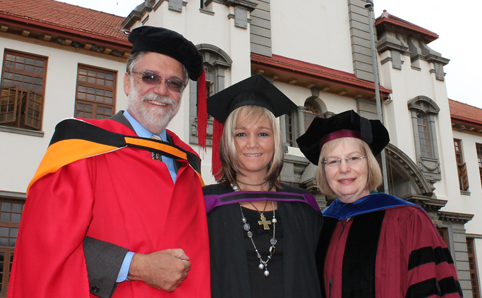 |
|
Proud academics celebrate their child's achievement.
Salomé Naudé received her B.Med.Sc-degree. Her parents are Prof. Jacobus Naudé and Prof. Cynthia Miller-Naudé. (Senior Professors from the Department of Classical and Near Eastern Studies.
Photo: Leonie Bolleurs
2 April 2012
|
The University of the Free State (UFS) hosted its autumn graduation ceremony on the Bloemfontein Campus last week where the most diplomas, certificates and degrees were awarded at eight different ceremonies in the Callie Human Centre.
A total of 629 diplomas and certificates and 2856 degrees were awarded from Tuesday 27 March 2012 to Friday 30 March 2012.
“Use your degree to improve the lives of people. Do justice,” Prof. Jonathan Jansen, UFS Vice-Chancellor and Rector, encouraged the graduates.
“People know it as a university that chooses restoration over revenge and forgiveness over vengeance.”
Mr. Roland Rudd, a Kovsie alumnus, told students that their blood, sweat and tears had paid off.
Mr. Rudd is a former education student who recently was named the Best Secondary Teacher in the Western Cape.
A highlight of the autumn graduation was when Natalie Jordaan received a standing ovation during the ceremony for the Faculty of Economic and Management Sciences. She is the first Deaf student in the history of the university to receive her degree. Natalie’s first language is Sign Language.
Marina Viljoen, a recipient of one of the university’s 12 Dean’s Medals, also received nine awards at the Faculty of Law’s prize giving ceremony. She was awarded the degree LL.B. (summa cum laude).
Johané Nienkemper (B.Sc. Hons.) received the Senate’s Medal and Prize as the best honours student at the UFS, as well as the Dean’s Medal as the best honours student in the Faculty of Natural and Agricultural Sciences.
Potella Sibongile, a Xhosa imbongi (praise singer) and UFS student received his degree in B.Com.Financial Administration. Potella delivered a praise poem to the graduates before they received their degrees, saying they “will now receive a new birth certificate”.
Master’s degrees and doctorates will be conferred at the Bloemfontein Campus on Thursday 14 June 2012.
The graduation ceremony of the Qwaqwa Campus will take place on 12 May 2012. Diplomas/certificates, degrees and doctorates will be awarded during the ceremony.